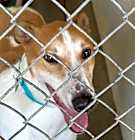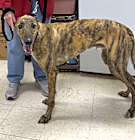Greyhounds weigh between 54 and 83 pounds and stand around 27 to 30 inches tall, with males being larger than females. These pups are considered a medium to large breed of dog.
Greyhound
Breed Type: Hound
Common nicknames: English Greyhound, Racing Dog, 40 mph Couch Potato
Coat: Smooth
Hypoallergenic: No, they will likely trigger allergies.
Temperament: Gentle, affectionate, adaptable, patient
Life expectancy: 10-13 years
Color & patterns:

Greyhounds are sleek and athletic dogs known for their speed; they can reach speeds of up to 45 miles per hour. These medium to large-sized dogs have a unique body structure, with long, powerful legs, deep chests, and slim builds that allow them to run with exceptional efficiency. Their short, smooth coats can be a variety of colors, including black, white, fawn, brindle, and blue. Greyhounds are also known for their gentle and calm demeanors, making them great family pets. They are affectionate dogs who love to snuggle up with their pet parents and are known for their gentle natures around children.
Greyhound characteristics
Learn about about Greyhound basics like their fur colors, shedding levels, how much grooming they need, and other Greyhound facts.
Average height
27-30 inches (68.6-76.2cm)
Average weight
54-83 pounds (24.5-37.6 kg)
Average lifespan
10-13 years
Exercise needs
Grooming needs
Full-grown size
Good with cats
Good with kids
Training Aptitude
Do Greyhound dogs shed?
Yes, Greyhounds shed, but they are considered moderate shedders. They have a short, smooth coat that sheds minimally throughout the year. Regular grooming with a soft-bristle brush or grooming mitt can help remove loose hair and minimize shedding.
What color are Greyhound dogs?
Greyhounds can be fawn, brindle, black, blue, red, and white. These colors can appear as solid coats or with various markings and patterns, such as white markings on the chest, feet, or face, or brindle patterns with streaks or stripes overlaid on a lighter base color.
What does a Greyhound dog look like?
Greyhounds are slender and athletic dogs with a graceful and elegant appearance. They have a long, narrow head with a distinctive tapering muzzle and folded ears that are often held back at rest. Their body is characterized by a deep chest, long legs, and a curved tail.
What is a Greyhound dog?
A Greyhound is a sleek and elegant dog breed known for its speed, agility, and graceful appearance. The breed belongs to the sighthound family, which means it hunts primarily by sight rather than scent.
How long do Greyhound dogs live?
Greyhounds live between 10 and 14 years, but individual lifespans can vary depending on genetics, diet, exercise, and overall health care.
When do Greyhound dogs stop growing?
Greyhounds generally stop growing around 18 months to two years of age, but some Greyhounds may continue to fill out and develop muscle until they are around three years old.
How fast can a Greyhound dog run?
Greyhounds can run up to 40 to 45 miles per hour over short distances. Some Greyhounds have been recorded running even faster, with top speeds exceeding 45 miles per hour.
Greyhound history
Learn about where this Greyhound came from!
What were Greyhound dogs bred for?
Greyhounds were originally bred for hunting purposes, specifically for coursing game such as deer, hare, and other small prey animals. Their exceptional speed, agility, and keen eyesight made them well-suited to chasing down fast-moving prey across open terrain. Over time, they also gained popularity as racing dogs due to their impressive athleticism and natural inclination to run.
Where are Greyhound dogs from?
Greyhounds are believed to have originated in ancient Egypt over 4,000 years ago, where they were admired as hunting companions and symbols of nobility. Modern Greyhounds as we know them today trace their ancestry to Europe, particularly England and surrounding regions.
Greyhound temperament
Learn about about the Greyhound temperament and how well they fit into your lifestyle, home environment, and family.
Are Greyhounds good guard dogs?
No, Greyhounds are not regarded as good guard dogs in the traditional sense. While Greyhounds may alert their humans to the presence of strangers by barking, these pups tend to be more interested in making friends than guarding property.
Are Greyhound dogs good with kids?
Yes, Greyhounds are good with kids. These pups are gentle, patient, and even-tempered, making them suitable companions for children.
As with any breed, it is recommended that your child is always supervised when interacting with your Greyhound to keep both the child and dog safe. Teaching children how to properly approach and handle dogs is crucial to ensure positive experiences for both the dog and the child, as is teaching dogs how to interact gently with children.
Are Greyhound dogs aggressive?
No, Greyhound dogs are not aggressive. They tend to be friendly and sociable with both people and other animals. However, like any breed, individual temperament can vary, so proper socialization and training are important to ensure they are well-behaved.
If you are concerned by any signs of aggression or reactivity in your dog, be sure to address it promptly with the help of a professional trainer or behaviorist. Pain, discomfort, or underlying medical conditions can sometimes contribute to changes in a dog’s behavior, so it may also be worth visiting a vet to rule out their health as a cause for their behavior.
Are Greyhound dogs easy to train?
Yes, Greyhounds can be easy to train if effective training methods are used. These dogs are intelligent and eager to please, which can make them receptive to training. However, Greyhounds also have an independent streak and may be stubborn, so positive reinforcement-based training methods, patience, and firmness are key to successfully training Greyhounds.
It's worth noting that training any dog takes substantial time and effort, regardless of breed.
Are Greyhounds good dogs?
Yes, Greyhounds are good dogs. They are gentle, affectionate, and even-tempered and can thrive in various living environments. Potential pet parents should consider their unique characteristics, such as their need for regular exercise and socialization, before committing to a Greyhound.
Do Greyhound dogs bark a lot?
No, Greyhounds don’t bark a lot. They tend to be quiet and reserved dogs and may only bark occasionally to alert their humans to potential threats or unfamiliar situations. However, individual temperaments can vary, and some Greyhounds may be more vocal than others.
Are Greyhounds good family dogs?
Yes, Greyhounds can be good family dogs. They are known for their adaptability and ability to form strong bonds with their human family members. At the same time, potential pet parents should consider the dog’s individual temperament, energy level, and compatibility with children and other pets before bringing a Greyhound into a family environment.
Are Greyhound dogs good with cats?
Yes, Greyhound dogs can be good with cats if they are introduced and socialized with them from a young age. While they have a calm and gentle demeanor, some Greyhounds may have a higher prey drive than others. Supervision and gradual introductions are essential to ensure a positive relationship between Greyhounds and cats in the same household.
Are Greyhounds good with other dogs?
Yes, Greyhounds can be good with other dogs if they are socialized and introduced properly. These pups have a friendly and sociable nature, but some Greyhounds may be more selective or cautious around unfamiliar dogs. Early socialization, positive reinforcement training, and supervision can help prevent conflicts between Greyhounds and other dogs.
Are Greyhound dogs smart?
Yes, Greyhound dogs are smart. They have keen instincts and are quick learners, which can contribute to their success in various activities such as racing, obedience, and agility.
Are Greyhounds good hiking dogs?
Yes, Greyhounds can be good hiking dogs, but this depends on their individual health, fitness level, and the terrain of the hike. While Greyhounds are known for their speed and agility, they are also sighthounds bred for short bursts of energy rather than endurance. As a result, they may not have the stamina for long or strenuous hikes.
Can a Greyhound be a service dog?
Yes, a Greyhound can be a service dog. While they may not be as commonly used for service work as some other breeds, their intelligence, adaptability, and gentle nature can make them good candidates for certain types of service tasks, such as mobility assistance or emotional support.
Are Greyhound dogs good apartment dogs?
No, Greyhound dogs are not good apartment dogs, but they can adapt to apartment living under the right circumstances. While they tend to be calm and low-energy indoors, they still require regular exercise to maintain their physical and mental well-being. Greyhounds are known for their speed and agility, and they may benefit from having access to outdoor spaces where they can stretch their legs and run freely.
Are Greyhounds good first dogs?
Yes, Greyhounds are good first dogs. Greyhounds are gentle, affectionate, and easygoing, but they also have unique characteristics and care requirements that may not be suitable for everyone. Prospective pet parents should be prepared to provide proper socialization, training, exercise, and veterinary care to meet their needs.
Are Greyhounds lazy dogs?
Yes, Greyhounds are lazy dogs. While they are known for their bursts of speed and athleticism, they are also content to spend much of their time napping or lounging around the house. At the same time, they still require regular exercise to stay healthy and happy.
Greyhound health
Learn about about the Greyhound health outlook and what diseases they may be prone to at various stages of their life.
Are Greyhounds healthy dogs?
Yes, Greyhounds are healthy dogs but are prone to certain health issues, including:
Osteosarcoma: Greyhounds are at increased risk of developing osteosarcoma, which is a type of bone cancer. This aggressive cancer commonly affects the limbs and can cause lameness, swelling, and pain. Treatment often involves amputation of the affected limb, followed by chemotherapy.
Esophageal achalasia: Greyhounds are susceptible to esophageal achalasia, or when the nerves in the esophagus become damaged and make it difficult for food to pass properly. The condition can cause vomiting, pneumonia, pulmonary conditions, and, in extreme cases, esophageal cancer.
Gastric dilatation-volvulus (GDV): GDV, also known as bloat, is a life-threatening condition that can affect Greyhounds. It occurs when the stomach fills with gas and twists on itself, leading to rapid onset of shock and death if not treated promptly. Preventative measures such as feeding smaller, more frequent meals and avoiding exercise after meals can help reduce the risk.
Hypothyroidism: Greyhounds are prone to hypothyroidism, a condition where the thyroid gland does not produce enough thyroid hormone. Symptoms may include weight gain, lethargy, hair loss, and skin issues. Treatment typically involves lifelong thyroid hormone supplementation to manage symptoms.
Dental issues: Greyhounds are more prone to dental problems such as periodontal disease and tartar buildup. Regular dental care, including tooth brushing, dental cleanings, and providing appropriate chew toys, can help prevent dental issues and maintain oral health.
Dilated cardiomyopathy (DCM): Greyhounds may be predisposed to dilated cardiomyopathy, a condition where the heart muscle becomes weakened and enlarged, leading to poor heart function. Symptoms may include coughing, lethargy, and difficulty breathing. Treatment may involve medications to support heart function and improve quality of life. Early detection and management are crucial for managing DCM in Greyhounds.
Are Greyhound dogs hypoallergenic?
No, Greyhounds are not hypoallergenic. While they have short coats that shed minimally compared to some other breeds, they still produce dander, saliva, and other allergens that can trigger allergic reactions in sensitive individuals. People with allergies to dogs may still experience symptoms around Greyhounds, although they may be less severe compared to breeds with longer or denser coats.
Do Greyhound dogs need a lot of exercise?
No, Greyhound dogs don’t need a lot of exercise. While Greyhounds are known for their sprinting abilities, they don’t necessarily need a lot of exercise in terms of duration. They do benefit from regular, moderate exercise to keep them healthy and mentally stimulated. Daily walks, short runs, or play sessions in a fenced area can help meet their exercise needs.
Popular Greyhound mixes
Breeds that mix with Greyhounds include Labrador Retrievers and Doberman Pinschers. Other breeds that mix well with Greyhounds include:
Greyador (Greyhound + Labrador Retriever)
Doberman Greyhound (Doberman Pinscher + Greyhound)
Greybull Pit (Greyhound + American Pit Bull Terrier)
Irish Wolf Greyhound (Greyhound + Irish Wolf)

Find Greyhound puppies near you
Adopting a Greyhound
Learn about acquiring a Greyhound - the pros and cons of adopting versus going through a breeder, and associated costs.

Pudge
Greyhound Hound (Unknown Type)
Female, 3 yrs 7 mos
Westerville, OH
Not good with dogs
Not good with cats
Spayed or Neutered
Shots are up-to-date

Woody
Greyhound Hound (Unknown Type)
Male, adult
Westerville, OH
Good with dogs
Not good with cats
Spayed or Neutered
Shots are up-to-date

Reacher
Greyhound Hound (Unknown Type)
Male, 3 yrs 6 mos
Westerville, OH
Good with dogs
Not good with cats
Spayed or Neutered
Shots are up-to-date

Pepper Jack
Greyhound Coonhound (Unknown Type)
Male, 2 yrs 6 mos
Westerville, OH
Good with dogs
Not good with cats
House-trained
Spayed or Neutered
Shots are up-to-date

Peter
Greyhound
Male, young
New Albany, OH
Not good with dogs
Not good with cats

Meg
Greyhound
Female, young
New Albany, OH
Not good with dogs
Not good with cats

Pudge
Greyhound Hound (Unknown Type)
Female, 3 yrs 7 mos
Westerville, OH
Not good with dogs
Not good with cats
Spayed or Neutered
Shots are up-to-date

Woody
Greyhound Hound (Unknown Type)
Male, adult
Westerville, OH
Good with dogs
Not good with cats
Spayed or Neutered
Shots are up-to-date

Reacher
Greyhound Hound (Unknown Type)
Male, 3 yrs 6 mos
Westerville, OH
Good with dogs
Not good with cats
Spayed or Neutered
Shots are up-to-date

Pepper Jack
Greyhound Coonhound (Unknown Type)
Male, 2 yrs 6 mos
Westerville, OH
Good with dogs
Not good with cats
House-trained
Spayed or Neutered
Shots are up-to-date

Peter
Greyhound
Male, young
New Albany, OH
Not good with dogs
Not good with cats

Meg
Greyhound
Female, young
New Albany, OH
Not good with dogs
Not good with cats
